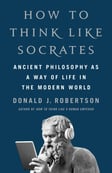Become a Creator today!Start creating today - Share your story with the world!
Start for free
00:00:00
00:00:01

Rational Emotive Behavior Therapy (REBT) and Stoicism
In this episode, I speak with Dr. Walter Matweychuk. Dr. Matweychuk is a practicing psychologist in the Department of Psychiatry at the University of Pennsylvania Health System, and has an independent telehealth practice in Manhattan with clients worldwide. He is also an adjunct professor of Applied Psychology at New York University. He has personally worked with both of the two main pioneers of cognitive-behavioral therapy: Albert Ellis and Aaron T. Beck. He is the author of several books on Rational Emotive Behaviour Therapy (REBT), including Rational Emotive Behaviour Therapy: A Newcomer's Guide and The REBT Pocket Companion for Clients.
Transcript
Introduction to Podcast and Guest
00:00:01
drobertson
Hello and welcome to Stoicism Philosophy as a Way of Life. My name is Donald Robertson and today's guest is Dr. Walter Matwechuk. Dr. Matwechuk is a practicing psychologist in the Department of Psychiatry at the University of Pennsylvania Health System and has an independent telehealth practice in Manhattan with clients worldwide. He's also an adjunct professor of applied psychology at New York University. He's personally worked with both of the two main pioneers of cognitive behavioral therapy, Albert Ellis and Arun T. Beck.
00:00:31
drobertson
He's the author of several books on rational emotive behaviour therapy, including Rational Emotic Behaviour Therapy and Newcomers Guide and the ah REBT Pocket Companion for Clients. And every Saturday at 9am in New York City on Zoom, he does a demonstration of ah REBT with a volunteer willing to discuss a real problem, which has now surpassed 218 consecutive weeks.
Registering for Dr. Matwechuk's Zoom Call
00:00:53
drobertson
Go to his website, rebt.com, that's rebt.com. I'll include the link to register for the link for the Zoom call. Walter, it's great to see you again, my friend. How are you?
00:01:07
Walter Matweychuk
In here, Don, it's always a pleasure to talk to you. I have a great respect for the work that you're doing for ah modern stoicism and the writing that you're doing. And it's always a pleasure to sit down and speak with you.
00:01:19
drobertson
Thank you. i And I can honestly say that you're the kind of guy I like, Walter, because you seem to me to be someone who's committed to a particular approach that involves helping people.
00:01:32
drobertson
And it's not a crazy approach.
00:01:33
Walter Matweychuk
and
00:01:33
drobertson
like Rational but behavior therapy is an approach that I've always had a soft spot for personally.
Rational Emotive Behavior Therapy (REBT) Overview
00:01:40
drobertson
You know, it's not my ah approach to doing therapy, although I'm kind of familiar with aspects of it, but it's a credible approach that really resonates with stoic philosophy. And so I kind of admire your commitment to the work that you're doing with those clients using, you know, a good, solid cognitive behavioral type method.
00:01:59
Walter Matweychuk
Thank you. It is a sensible approach and teaches very practical strategies and ideas
00:02:06
drobertson
So let's dive into some of these questions that I had prepared. And the first one is, I think the audience for this podcast are mainly people that are interested in stoicism and kind of related subjects. And most of them I think will have heard of REBT, but they wouldn't know that much about it generally speaking. So they're perfectly primed to learn more. So a good place to begin then is with a definition effect. What an earth is REBT?
00:02:34
Walter Matweychuk
RBT is an amalgamation of ancient and modern philosophy that's packaged for helping people manage their emotions and minimizing pain, maximizing pleasure.
00:02:52
Walter Matweychuk
and living a meaningful life. It relies heavily upon the adoption of responsibility for their emotional reactions and teaches people healthy attitudes that will enable them to face adversity and meet the challenges of life.
00:03:14
drobertson
And there's so many angles that we could adopt on this to dig into a bit deeper, but actually one of the first questions I want to ask is, so I would see ah REBT is one of the main i earliest forms, like pioneering forms of cognitive behavioral therapy, but you've also studied Becky in cognitive therapy, like and you've you've worked with Aaron T. Beck, the the pioneer of that approach. So I wonder, why did you choose to focus more on REBT then on Beck's approach.
REBT vs. Cognitive Therapy
00:03:45
Walter Matweychuk
I think REBT is a stronger psychotherapy, although I have great respect for Aaron Beck and the research he's done and and his ah distinguished ah researchers that he trained.
00:04:02
drobertson
Mm hmm.
00:04:03
Walter Matweychuk
I think that it isn't um as um helpful in the long run. I think that REBT has some distinctive qualities that I really appreciate, so let me list them quickly.
00:04:14
drobertson
Yeah.
00:04:15
Walter Matweychuk
First of all, it emphasizes attitudes over inferences.
00:04:20
drobertson
Mm hmm.
00:04:21
Walter Matweychuk
The cognitive therapy approach that Aaron Beck pioneered is essentially an approach that teaches people to be suspicious that some of their thinking may be distorted.
00:04:28
drobertson
And.
00:04:34
Walter Matweychuk
REBT doesn't disagree with that, but it argues that sometimes our thinking is not distorted when but really tragic events happen. Our thinking may not be distorted. They are truly bad. And so REBT starts with the premise that with healthy attitudes,
00:04:59
Walter Matweychuk
about very negative circumstances, we can have a healthy response to them. The begging approach assumes distortion in one's thinking. And this can handcuff them because when our thinking is not distorted, let's say your child dies,
00:05:24
Walter Matweychuk
Well, there's there and to think that it is distorted is probably a bridge too far. And so the Beckian approach says, well, we don't we don't a challenge ah thoughts that are facts.
00:05:42
drobertson
Mm-hmm.
00:05:43
Walter Matweychuk
What we will then do is engage in behavioral skills training, problem-solving training. That looks good on paper, but the problem with that is that you need a little philosophy too, simply because if a child dies,
00:06:00
Walter Matweychuk
the ah be the The problem-solving solution would be to wait a certain period of time, grieve, and then bear another child, replace the child. That's a problem-solving approach. You lose a job, go get another one. But it would seem to me that that therapy is um the empowered
00:06:23
drobertson
right
00:06:23
Walter Matweychuk
when the therapeutic process addresses the philosophical attitudes one has towards great misfortune.
00:06:29
drobertson
Mm hmm.
00:06:31
Walter Matweychuk
And that's where REBT starts with, assuming the worst case scenario, not assuming a distorted cognitive processing, and then helping people come to terms with reality as it is and
00:06:40
drobertson
Right.
00:06:49
Walter Matweychuk
cultivating flexible attitudes, non-extreme attitudes that allow them to live with a grim reality.
Applications of REBT
00:06:56
Walter Matweychuk
That's the first point that makes me an R&D therapist, because I think it can handle really bad scenarios.
00:06:57
drobertson
huh.
00:07:03
Walter Matweychuk
It wasn't developed for DSM diagnoses. So it has the ability to both help people with psychiatric disorders, but also to help with problems of daily living.
00:07:15
Walter Matweychuk
So for example, self-discipline and self-control. is something that all people could use. And and and so I think REBT is ah well-equipped to have the goal of enhancing self-control and self um-discipline.
00:07:34
drobertson
Mm-hmm.
00:07:36
Walter Matweychuk
it teaches be it It teaches people the difference between what we call ego disturbance, which is where you rate yourself as a bad person or lesser of a person and you have low self-esteem, and it teaches people to accept themselves and then to work on the parts of themselves that they may dislike.
00:07:59
drobertson
Mm-hmm.
00:08:02
Walter Matweychuk
So i ah traditional Beckian therapy attempts to help people boost their self-esteem, which REVTCs as an Achilles heel, boosting esteem, self-esteem, because it can come down and then you have a problem.
00:08:04
drobertson
Mm-hmm.
00:08:16
drobertson
Right.
00:08:19
drobertson
Yeah.
00:08:21
Walter Matweychuk
So we encourage people to develop self-acceptance.
00:08:22
drobertson
Yep.
00:08:25
drobertson
Mm-hmm.
00:08:25
Walter Matweychuk
I think that's not linked in to any condition. And then finally, REBT makes, well, there's two other points.
00:08:30
drobertson
Mm-hmm.
00:08:33
Walter Matweychuk
One is that REBT encourages people to to tolerate discomfort. I think the Beckian model doesn't emphasize what we would call discomfort disturbance.
Emotional Distinctions in REBT
00:08:44
Walter Matweychuk
um and And that might um be very important in this world because there's a great deal of discomfort.
00:08:49
drobertson
Yeah.
00:08:51
Walter Matweychuk
And then finally, REBT teaches people to have healthy negative emotions.
00:08:54
drobertson
Mm-hmm.
00:08:55
Walter Matweychuk
Rather than just dampen down depression or dampen down anxiety, we're going to make a distinction between concern, a healthy emotion, and anxiety, an unhealthy emotion.
00:09:08
Walter Matweychuk
We're going to make a distinction between sorrow, a healthy emotion, and depression, an unhealthy emotion.
00:09:08
drobertson
Uh-huh.
00:09:14
Walter Matweychuk
So there are the major reasons. I remain a firm proponent of the ah REBT model.
00:09:18
drobertson
Well.
00:09:24
drobertson
There's a lot of food for thought there and a lot of things to discuss. We'll come back to some of those a bit later, but I think already listeners might get a sense of why REBT might resonate more with stoicism, because apart from anything else, you've mentioned philosophical attitudes a couple of times, and definitely a REBT comes across as if it's targeting our beliefs and attitudes at a kind of broader, deeper, more philosophical,
00:09:53
drobertson
way than traditional Beckian therapy, perhaps, or the focus is more like that. REBT, I think, lends itself more than Beckian therapy to developing a kind of philosophy of life. I think that that's part. And maybe also, do I just want to ah jump ahead a little bit and ask you one question. Do you think REBT in some regards lends itself more than Beckian therapy to a preventative approach like emotional resilience building?
00:10:25
Walter Matweychuk
Well.
00:10:28
Walter Matweychuk
Ellis one time operated a school in Manhattan for young children, and he had that premise that if you taught REBT in the schools to children at a young age, that you would probably ah prevent emotional disturbance before it arises.
00:10:34
drobertson
Mm-hmm Interesting
00:10:49
Walter Matweychuk
ah You couldn't eliminate it, of course, that way, but you could at least skill people from a ripe young age. do i think it it Does it lend itself to resilience?
00:11:01
Walter Matweychuk
I would have to say yes, because I see Becky in therapy as an engineering cognitive behavior therapy as a protocol-driven approach to mainly diagnose a disorder of the psychiatric manual.
00:11:17
drobertson
Yeah. Yeah.
00:11:20
Walter Matweychuk
and And so, REBT is trying to go beyond helping people ah recover from disorders, but actually inoculate them for future adversity and in many ways that I think overlaps with the definition of resilience.
00:11:37
drobertson
I think another thing just to mention to listeners as well, perhaps, that might not be familiar with Ellis's work is that unlike Beck, I mean Beck has kind of, let me think, Beck has co-authored at least one self-help book or workbook, maybe ah a couple, but but Ellis was a much more prolific self-help author.
00:11:56
drobertson
And ah I guess, you know, his work reached the general public a lot more directly that than Beck stood. It seems to me, yeah.
00:12:05
Walter Matweychuk
Oh, yeah, for sure. I mean, the one book um that he wrote had ah millions of copies distributed, a New Guide to Rational Living.
00:12:15
Walter Matweychuk
And so, ah yeah.
00:12:15
drobertson
Yeah. Let me ask you about another type of therapy then. and And then before we go on to talk about philosophy and some other subjects, what about like much more recent developments in the field of psychotherapy, what's sometimes called the third wave in cognitive behavioral therapy or mindfulness and acceptance-based approaches.
Comparison with Third Wave Therapies
00:12:37
drobertson
How do you see those? i So for I guess for the listeners, we're talking about things like mindfulness-based cognitive therapy, metacognitive therapy, dialectical behavior therapy.
00:12:48
drobertson
acceptance and commitment there. All that kind of stuff. There's loads of them, right? There's a bunch of them. and But they're usually lumped together and referred to as the FUD wave or mindfulness and acceptance-based approaches. How do you see those more recent developments in relation to r REBT?
00:13:06
Walter Matweychuk
I think that I'm going to talk mainly about DBT, dialectical behavior therapy and acceptance and commitment therapy, because I must admit, I'm most familiar with those two and less familiar with the others, but I think they're good representatives of the third wave.
00:13:17
drobertson
Yeah.
00:13:24
Walter Matweychuk
So, okay.
00:13:24
drobertson
Yeah.
00:13:26
Walter Matweychuk
I think IBT is much closer in many ways to DBT and um i there much there's much about DBT I like. I don't think DBT does as good a job at teaching um acceptance.
00:13:41
Walter Matweychuk
it it It talks about radical acceptance, but REBT really breaks um acceptance into three varieties, self-acceptance that's unconditional or radical, if you will, other acceptance, which is
00:13:47
drobertson
right
00:13:56
Walter Matweychuk
unconditional or radical, if you will, and life acceptance, which is unconditional and radical. And we argue that rigid and extreme attitudes will undermine the cultivation of this sort of acceptance. And so we are going to really target those attitudes. Now, Marshall Lenehan makes the argument that you have to start with the mindfulness of DBT, that skill, in order to effectively teach emotional regulation and problem solving skills and all the others. And quite frankly, I don't think that premise is absolutely necessary. I have no problem with mindfulness, teaching people mindfulness, but I don't believe it's a necessary prerequisite for teaching people how to regulate their emotions.
00:14:46
Walter Matweychuk
um Second of all, a lot of her ah ah component skills that she teaches in her different modules are things that REBT has taught, assertiveness training skills, problem-solving skills, and for that matter, Beck does too, or Beckian tradition does, but they do it in a much more formal way.
00:15:08
Walter Matweychuk
it through When you're doing it in a hospital, And people are in a formal DBT program. But when you're in private practice, who knows what's actually going on there?
00:15:18
Walter Matweychuk
Because you have an individual in private practice, they close the door, the therapist is their DBT therapist, and whether I doubt they're going through the modules like they would.
00:15:23
drobertson
Yeah.
00:15:28
Walter Matweychuk
So that's where things get a little blurry.
00:15:28
drobertson
Uh-huh.
00:15:31
Walter Matweychuk
I think DBT becomes a little bit like REBT, less formally wedded to modules and things like that.
00:15:31
drobertson
Indeed.
00:15:39
drobertson
Yeah. Actually, there's research that shows that clinicians adherence to protocols that are used in research studies and their practices is is pretty flaky.
00:15:40
Walter Matweychuk
um
00:15:50
drobertson
like you know that people People aren't behind behind closed doors doing exactly what's written up in in treatment protocols and research studies, that's for sure.
00:15:50
Walter Matweychuk
Yes.
00:15:59
drobertson
like They do a mishmash of whatever they're enter into a lot of the time. But what about things like meditation? And so, I mean, I'm pretty sure Ellis, you know, Ellis was, in some regards, a very eclectic like therapist.
00:16:12
drobertson
He kind of acknowledged a role for lots of different behavioral therapy techniques and, you know, techniques from humanistic therapies. I'm sure at some point he probably acknowledged that but meditation might be of value as a kind of component or an adjunct.
00:16:24
Walter Matweychuk
I think he would, I think I one time walked in in his office before supervision and he was either relaxing or meditating or snoozing.
00:16:30
drobertson
Hmm. Right.
00:16:33
Walter Matweychuk
I don't know one of the three, but the point is, ah I think he would say meditation is useful, but insufficient.
00:16:38
drobertson
Uh huh.
00:16:41
Walter Matweychuk
I think that he would see it as palliative, but in and of itself, um not sufficient that we could do better than that and really help people have a profound philosophical shift.
00:16:44
drobertson
Right.
00:16:48
drobertson
Right.
00:16:52
drobertson
Wow.
00:16:54
Walter Matweychuk
Not all people will achieve this, but many can, and that we should therefore try for that.
00:16:54
drobertson
Mm hmm.
00:16:58
drobertson
Right.
00:17:01
Walter Matweychuk
So i know' it's not either meditation or REBT, it's and both with emphasis on the profound philosophical attitudes that REBT teaches.
00:17:07
drobertson
Yeah.
00:17:13
drobertson
Well, I'm going to say something controversial, and I've got a bunch that might agree with me about this, actually. I'm a big fan of mindfulness.
00:17:18
Walter Matweychuk
help
00:17:19
drobertson
I think it's great. I like mindfulness as much as the next guy, right? You know, I used to practice Buddhist meditation. I used to go on Buddhist retreats and stuff like that. But it struck me that when I did Buddhist meditation, we would study Buddhism and we studied the philosophy and psychology. So when we were paying attention to our own thoughts with detached awareness and all that kind of stuff, we had ideas about what were healthy and unhealthy ways of thinking. And we we would notice things about our stream of consciousness informed by Buddhist philosophy. And it's the same in Stoicism as well. So I think mindfulness only goes so far if you don't know what it is that you're observing. And REBT gives you
00:18:04
drobertson
like a framework for understanding, for conceptualizing, as we say sometimes, what's going on with your emotions. And, you know, I think that REBT actually provides a very good foundation for then subsequently doing mindfulness meditation.
00:18:20
Walter Matweychuk
Yeah. R-A-B-T will define ah healthy cognitions as flexible and non-extreme and will give people a way of evaluating their cognitions to a criteria for determining whether a cognition is healthy or unhealthy whether and those criteria we could talk about, but um I agree with you.
00:18:46
drobertson
So if you're, to I mean, I think a lot of people think that you can just sit down and practice mindfulness, but if they, they might not really know what it is that they're observing about their own thoughts and feelings, you know, whereas if they studied REBT and they're kind of familiar with it, they might begin to notice in their stream of consciousness, signs of rigid beliefs and, you know, irrational demands and things like that, or awfulizing and so on. You know, you we, our see our framework informs the way that we experience mindfulness, I believe,
00:19:15
drobertson
Let me ask you another question, then I guess it falls on from these sort of comparisons. yeah I like to ask this to to people that practice different styles of therapy. If you could go back in time and change something about REBT, what would you change about it?
00:19:34
Walter Matweychuk
Um, you know, I think it would have been better had it not ah had to be rebranded from rational therapy, which it was in its infancy to rational motor therapy to then RBG.
00:19:42
drobertson
Right.
00:19:44
drobertson
Uh-huh. Uh-huh.
00:19:48
Walter Matweychuk
I think, um, if we went back in time,
00:19:49
drobertson
Uh-huh.
00:19:52
Walter Matweychuk
ah Maybe more effort would have been to get it into academia, to be researched, whereas um these other therapies like DBT Act and cognitive therapy were all developed in academia, so there's a greater research base for it.
00:19:58
drobertson
Yeah. Yep. Yeah.
00:20:09
Walter Matweychuk
but you know The thing is, the fact that REBT was developed outside of academia is both both a cursing and a blessing because that's what it's the the original trans-diagnostic model that was developed um in the rough and tumble streets of Manhattan.
00:20:16
drobertson
Yeah.
00:20:21
drobertson
Yes.
00:20:25
Walter Matweychuk
so Like Stellas, it has a very gritty feel to it, which I think is absent in i think it's very absent in ACT and probably
00:20:26
drobertson
Yeah.
00:20:30
drobertson
yeah
00:20:35
Walter Matweychuk
um so so so would i What would I go back?
00:20:40
drobertson
Yes.
00:20:41
Walter Matweychuk
um Encouraging research to be done on it by independent third parties, but that's hard to do if you don't train research and almost didn't train researchers.
00:20:46
drobertson
Yeah.
00:20:50
drobertson
Right.
00:20:53
drobertson
Yeah. Yeah. Well, the other thing you mentioned was the name. So what was it? You think it should have just continued to be called rational therapy.
00:21:02
Walter Matweychuk
no no i think it would have been better if he would have just started from the outset and said rationally behavior therapy
00:21:04
drobertson
I was something I called to REB. I think it's about long-winded though.
00:21:09
Walter Matweychuk
He started with rational therapy and it would have been better had he not, but you know, he refined it over 60 years.
00:21:12
drobertson
Yeah.
00:21:16
Walter Matweychuk
So he went from rational therapy to saying, wait a minute, we got to also talk about emotion, emphasize that the therapy addresses emotions.
00:21:20
drobertson
Yeah.
00:21:23
Walter Matweychuk
And then Ray Corsini, an editor of books argued that you better, you do a lot of behavioral interventions.
00:21:25
drobertson
Uh-huh.
00:21:29
Walter Matweychuk
So why not the name be rational emotive behavior therapy?
00:21:32
drobertson
Yeah.
00:21:33
Walter Matweychuk
So it would have been better if he started where he ended.
00:21:33
drobertson
Yeah. I had someone, I had someone joke once that if he had lived longer, maybe we'd have got an A and an L in it as well. Cause it looked like he he was working towards having all the letters us of his name and R-E-B-T Albert.
00:21:49
Walter Matweychuk
Yeah, yeah, maybe.
00:21:51
drobertson
but so Well, what do you think is the future of r REBT then?
00:21:56
Walter Matweychuk
Wow. That sadly, I think the future of RBT is not a good one. um the The leadership in in has not done a good job of dissemin in maintaining a strong dissemination campaign.
00:22:01
drobertson
ah
00:22:11
Walter Matweychuk
um And so I think that bits and pieces of it will be broken off. And as it has been, I think there are bits and pieces of it found in other therapies, but the package whereby you say, you know, um the whole is greater than the sum of the parts, I don't know if that's going to be around 50 years from now, um because
00:22:23
drobertson
Mm hmm. Yeah. Right. Mm hmm.
Future and Challenges of REBT
00:22:37
Walter Matweychuk
um But then again, stoicism, you know, fell out of favor and then faced the resurgence.
00:22:40
drobertson
Yeah.
00:22:43
Walter Matweychuk
So we'll see.
00:22:43
drobertson
Yeah.
00:22:45
Walter Matweychuk
um But i'm i'm I'm trying to do my bit in disseminating what it means and keeping it alive and drawing attention to it.
00:22:47
drobertson
Uh huh.
00:22:53
Walter Matweychuk
But there is a movement towards integration, you know, um and I'm not so, ah I stay with more of the original model that el was generated.
00:22:54
drobertson
Wow. Yeah.
00:23:05
drobertson
Uh huh. Yeah, yeah. but Maybe I feel a bit more optimistic, slightly more optimistic about it than you do. I understand what you're saying though. i um My feeling is that the parallels that people see between REBT and Stoicism are actually ah kind of almost like ah an unexpected boon to some extent.
00:23:28
drobertson
for Because there's a lot of interest among this whole different demographic of people in REBT because they've been reading books about Stoicism.
00:23:34
Walter Matweychuk
See, but the problem done is the problem, Don, is there are not people like me who are proud to stand up and and define them ah define what they do.
00:23:40
drobertson
Uh-huh.
00:23:43
drobertson
Yeah.
00:23:44
Walter Matweychuk
I'm an REBT therapist. I challenge you to find somebody who says, oh, there's yeah, I use REBT, where people say I'm a cognitive behavior therapist.
00:23:48
drobertson
Right.
00:23:53
drobertson
Uh-huh. Right.
00:23:56
Walter Matweychuk
I'm a DBT therapist. Find somebody other than myself who may be Wendy Dryden in London.
00:24:02
drobertson
Ah, you beat me to it.
00:24:04
Walter Matweychuk
Well, but but short of he and, yeah, people don't stand up at a conference and say, hey, I'm an REBT therapist and we've been doing what you're talking about before you did.
00:24:06
drobertson
Who's the only one I can think of?
00:24:15
Walter Matweychuk
i'm Marsha Lenahan talks about the stress tolerance.
00:24:17
drobertson
Uh-huh.
00:24:18
Walter Matweychuk
and We've been talking about um ah tolerating discomfort before she came to the party.
00:24:20
drobertson
Yeah.
00:24:26
Walter Matweychuk
We were talking about acceptance before the That occurred.
00:24:27
drobertson
Yeah.
00:24:30
Walter Matweychuk
So people are not, I think, courageous enough to say, I'm an REBT therapist. I'm happy to say that. And you don't have to accept me if you don't believe it's a good therapist.
00:24:41
drobertson
is not trendy, right?
00:24:43
Walter Matweychuk
No. No, it's not.
00:24:44
drobertson
Like some some therapies are trendy, right? I think it's fair to say.
00:24:47
Walter Matweychuk
Yes.
00:24:48
drobertson
And there have been like fads or trends for different therapies over the years. They come in, some of them come and go. Our ABT's been ah been around for a while. Like it's been around for well over half a century.
00:24:59
drobertson
Now it's good, it's stood the test of time, like better than a lot of other therapies. ah But yeah, it's, I think the fact that it was one of the earliest forms of CBT counts against it in some ways, like in terms of a lot of clinical psychologists and cognitive behavioral therapists are always looking for the next best thing, you know, like what's coming, what's emerging, you know, and they they maybe they look at REBT as something that's kind of out of date.
00:25:30
Walter Matweychuk
Well, let's really be honest with each other, Don. um I don't think that hurt. and I don't mean to bad mouth anyone, but the way you get ahead often is to say that you've developed something new.
00:25:46
Walter Matweychuk
So I'm not against innovation.
00:25:46
drobertson
For sure.
00:25:49
Walter Matweychuk
But I remember when I was an undergraduate at the University of Pennsylvania, we had to take a history of psychology course. And the professor said, why are you taking this course?
00:25:55
drobertson
Yeah.
00:25:58
Walter Matweychuk
Why are you made to take it? And he said, it's because psychology has a tradition of taking old wine and putting it in new bottles and selling it as a new formulation.
00:26:05
drobertson
Yep. Couldn't agree more.
00:26:11
Walter Matweychuk
and so but And yeah you couldn't agree more. Right. And so what I i think is the problem is that people, I've done well professionally by going against the grain and saying, I didn't create this stuff.
00:26:14
drobertson
Right.
00:26:24
drobertson
Mm-hmm. Mm-hmm.
00:26:27
Walter Matweychuk
It's not all that different, but what I'm good at is communicating its utility. And I can show you how to help yourself and make your life better by using this system of ideas.
00:26:37
Walter Matweychuk
I think what happens in academia, if you either, You have to create a research program around your particular ideas.
00:26:48
Walter Matweychuk
That's how you get grants, and then you have to test them. and so these are There is a certain um um advantage to to creating something new and calling it something new.
00:26:52
drobertson
yeah
00:27:02
drobertson
Yeah, and it helps if you've got a diagram. i and ah other There's kind of like stereotypical ways of putting old wine in new bottles kind of thing. But actually, one thing I'd say, and this is a good segue into talking about philosophy,
00:27:17
drobertson
i Some people found Albert Ellis hard to get along with. I think that that's fair to say. he could be you know People say he could be kind of cantankerous at times or whatever. It wasn't everyone's cup of tea, but I always admired Ellis. I had a soft spot for him because I've always been a bit of a geek about the history of psychotherapy for some reason. It was just something that intrigued me. And Ellis is one of the few writers in the field that I felt really gave credit to the people that preceded him and his ideas he was influenced by. And partly for that reason, Ellis refers quite often to Epictetus i and the Stoics, you know, among many other things that he was of he was very widely read in philosophy and psychology and psychotherapy. And he drew on many different influences.
00:28:11
drobertson
um to form his thinking.
00:28:11
Walter Matweychuk
Thank you.
00:28:13
drobertson
And i that's something I always really admired about Ellis. Other writers are very unlike that. like you know They repeat other people. So often they repeat Ellis' ideas and don't really fully give him credit for it.
00:28:29
drobertson
I'm trying to avoid naming any particular names. I feel Beck does that some type.
00:28:32
Walter Matweychuk
i
00:28:34
drobertson
Beck draws in earlier approaches and maybe doesn't you know fully spell out that that's what he's doing. um
00:28:41
Walter Matweychuk
Yeah.
00:28:42
drobertson
But Ellis was was good in that regard and he talks about Epictetus. He loves this quote from Epictetus that says people are not distressed by events but by their opinions or judgments about them. Do you want to say a little bit about what you see as the kind of relationship or similarities between Ellis's approach and ah stoic philosophy?
00:29:08
Walter Matweychuk
Well, yeah first of all, the the um idea and stoicism of controlling certain things and and seeing other things as being outside one's domain of control, I think ties indirectly to REBT's idea of the principle of emotional responsibility whereby we draw people's attention to their attitude towards adversity and that the attitude is something that they can sort through and pick apart and then select and choose.
00:29:28
drobertson
Yeah.
00:29:38
Walter Matweychuk
and implement. So this dichotomy of control that sometimes did at the heart of stoicism, I think is also at the heart of our EBT be whereby we argue that you can choose to disturb yourself or you can choose to have a healthy negative emotion like sorrow or sadness or disappointment to to adversity.
00:29:44
drobertson
yeah
00:30:02
drobertson
You know, what I often ask people, hundreds and hundreds of people that I deal with over the years about, you know, what's the most helpful thing that they've taken from stoicism? There are many ideas and techniques in the ancient stoic literature that this dichotomy of control idea, which is the opening sentence of the Enchiridion or the Handbook of Epictetus.
00:30:20
drobertson
So it has this kind of, you know, it's obviously being emphasised by the ancient Stoics. Many people today that say just this distinction between what's under our control and what isn't directly under our control is the most helpful aspect of the philosophy for them.
00:30:36
drobertson
And I do see that as kind of resonating with aspects of REBT. Do you see there as being any other kind of connections between the two things?
00:30:42
Walter Matweychuk
Yeah.
00:30:45
Walter Matweychuk
I mean, I think that, for example, stoicism is not against this distinction between healthy emotions and emotions that get in the way.
00:30:53
drobertson
Indeed.
00:30:55
drobertson
This is very explicit in ancient Stoicism, yeah.
00:30:56
Walter Matweychuk
and
00:30:58
Walter Matweychuk
And REBT makes the same distinction between healthy sorrow or healthy concern and unhealthy emotions like depression, self-pity, rage, and anxiety.
00:31:05
drobertson
Yeah.
00:31:09
Walter Matweychuk
So I think there there is another um parallel. Another one is our stoicism encourages people to be a c citizen of the world.
00:31:20
Walter Matweychuk
And I think REBT likewise, I think
00:31:20
drobertson
Mm-hmm.
00:31:23
Walter Matweychuk
for as much as it talks about being self interested and putting yourself first and having enlightened self interest. It also says you better understand your impact upon others.
00:31:35
Walter Matweychuk
So it's a very ethical ah therapy, it encourages people to have the courage of their convictions, to be genuine and to treat other people that way they want to be treated so that we encourage people to have social interest.
00:31:35
drobertson
Mmhmm. Mmhmm. Yeah.
00:31:49
Walter Matweychuk
not just self-interest, and I think that's consistent with stoicism.
00:31:52
drobertson
Yeah. and Indeed. Well, let's dig in.
00:31:55
Walter Matweychuk
it's go to get
00:31:55
drobertson
There's a couple of other things that maybe are worth mentioning. I wanted to ask you about, so we'll get a little bit more into something that that maybe hasn't mentioned quite as much when people get the first brush with RABT.
00:32:07
drobertson
There's a technique in RABT called rational emotive imagery, if I remember correctly, right? I wonder if you could maybe say a little bit but about what that is.
00:32:13
Walter Matweychuk
yes
00:32:17
Walter Matweychuk
What rational amount of imagery is a guided exercise whereby the therapist teaches ah the therapist to vividly call to mind an emotionally laden episode.
00:32:33
drobertson
Mm-hmm.
00:32:34
Walter Matweychuk
ah For example, let's assume A person is very fearful of speaking in public so that they would the therapist would guide the patient to ah imagine themselves standing before an audience and um about to speak and being very anxious.
00:32:52
Walter Matweychuk
and And then after the third after the patient is signaled to the therapist that they have some degree of experience of anxiety, the the patient is encouraged to transform that emotion into a healthy feeling of concern.
00:33:11
Walter Matweychuk
and this But the patient isn't told how to do that. Now, what people will do and during this exercise is we'll get to a different feeling, less anxiety, by changing the vivid image.
00:33:26
drobertson
Mm hmm.
00:33:29
Walter Matweychuk
So instead of standing before a group of people, they may change the situation where they just see themselves standing before an empty audience.
00:33:34
drobertson
Yeah.
00:33:38
drobertson
Yeah. That's cheating.
00:33:40
Walter Matweychuk
and That's cheating, right? what What we're trying to do in rational mood ah imagery is to get people to literally experience,
00:33:42
drobertson
Yeah.
00:33:48
drobertson
Mm hmm.
00:33:50
Walter Matweychuk
have an experiential um um have a different experience with ah with a different emotion in the face of the adversity.
00:33:58
drobertson
Mm hmm.
00:33:59
Walter Matweychuk
so For example, I have pictured myself using RUB or rational emotive imagery with coping with the death of my wife. So I used to get anxious about my wife not being around. and And what I've learned to do is shift that emotion to concern or sorrow. And and so rational emotive imagery is practice at doing that. Now, the way you do that is by also changing how you think while vividly holding that that image in mind of that tragic day or standing before that audience.
00:34:38
Walter Matweychuk
So rational emotive imagery is practice through imagery at coping with the worst case scenario.
00:34:44
drobertson
Mm-hmm. Yep.
00:34:46
Walter Matweychuk
And it's it's practice at ah thinking differently and feeling differently.
00:34:51
drobertson
Right, so right there, do you know who you sound like?
00:34:54
Walter Matweychuk
Who?
00:34:55
drobertson
Seneca.
00:34:58
Walter Matweychuk
Good.
00:34:58
drobertson
Right?
00:34:58
Walter Matweychuk
and i mean i mean I've been ah ah compared to worse individuals.
00:34:59
drobertson
Casen-
00:35:04
Walter Matweychuk
that's Thank you. That's good to hear. But say more.
00:35:08
drobertson
But Cassinica, and actually the the other Stoics, are known for describing a technique that he calls in Latin, premeditatio malorum, that involves facing the worst-case scenario repeatedly in your imagination in order to rehearse more a more philosophical attitude towards adversity, I guess is the way that they would put it.
00:35:29
drobertson
um So there's I think there's a there are obvious similarities between this visualization or mental imagery technique in stoicism and rational emotive imagery.
00:35:29
Walter Matweychuk
and and open
00:35:40
Walter Matweychuk
Without a doubt, it's building calluses through exposure in imagery.
00:35:43
drobertson
Yeah.
00:35:47
Walter Matweychuk
and yeah um um i actually I like primidatio malorum as an expression. it's just a little bit um it's I generally don't refer to it as that, but occasionally it is essentially the same technique it sounds like to me.
00:36:03
drobertson
So that's another interesting parallel. I think there are quite a few other ones as well, but there's one now that's a little bit trickier to describe. So actually, there's a good segue here. There are many reasons why someone might benefit from visualizing a future adversity. Now, i as ah you were implying, I think, the way Ellis frames this is kind of something of an experiment in the consulting room. So the client's trying to figure out what needs to change in order for them to turn irrational anxiety into you know rational or healthy concern.
00:36:38
drobertson
um And what they're probably going to find from an REBT perspective is that they need to change their attitude, like their beliefs, their demands that they're making on the situation, on themselves, and so on.
00:36:53
drobertson
um And the Stoics, you know, like, for example, you might visualize a a scene just for emotional habituation and exposure therapy, right? You might visualize a scene in order to rehearse coping skills.
00:37:02
Walter Matweychuk
Right.
00:37:06
drobertson
like to picture yourself being more assertive, for example.
00:37:08
Walter Matweychuk
Right.
00:37:09
drobertson
There are many, you know, you might do it in a kind of mindfulness and acceptance based way to practice mindfulness and detachment or something like that. There's many different reasons, but in REBT, the kind of orientation is gonna be more in terms of these underlying irrational beliefs.
00:37:19
Walter Matweychuk
see
00:37:26
drobertson
And the same is true of Stoicism. That's another reason it's more similar. The Stoics are particularly concerned with a specific type of belief. And I guess that's ah a little bit of a difference from the traditional Beckian approach. I see the Beckian approach as casting its net a bit wider. And the it seems to me the emphasis in REBT is more ah is is more on specific types of beliefs, i as you implied earlier. And this is also the case in Stoicism. like The Stoics think the real problem are certain types of value judgments that we make.
00:38:04
drobertson
deep down that affect our ah life in a broad sense. So they're not interested so much in dealing with just the specific problem of that specific problem. They want to try and understand what all these problems have in common. and What's the theme that runs across the lot of them? You know, is it that I'm placing way too much importance on other people's opinions of me, for example?
00:38:27
drobertson
or way too much importance on ah material success, for instance, and not being kind of more adaptive or flexible in my thinking. So the Stoics do frame this differently from Alice. But they're both, I think, searching for the core of the problem in a more general sense. And they arrive at slightly different, but I think comparable positions.
Core Concepts of REBT
00:38:53
Walter Matweychuk
you. order, we're going to argue that rigid attitudes about the self, I have to do well or have desirable characteristics, rigid attitudes towards others. You have to treat me nicely. You have to love me and approve of me. and You have to respect me. and Then ah thirdly, the life has to be fair and predictable and safe and easy. that at the It is the rigidity directed at these three foci that lie at the core of disturbance,
00:39:22
Walter Matweychuk
And that then secondary derivatives follow, such as an extreme rating of how bad something is.
00:39:23
drobertson
Mmhmm. Mmhmm.
00:39:29
Walter Matweychuk
It's the end of the world if you don't love me and approve of me. And then hu yeah.
00:39:35
drobertson
See, maybe the difference is the Stoics probably think that the value judgment, the extreme rating is fundamental and that the demand is kind of secondary to that. But nevertheless, these two positions are pretty close.
00:39:48
drobertson
it's
00:39:50
Walter Matweychuk
yeah Yeah. And then same thing with ah attitudes of unbearability, which is the secondary, I can't stand it. this is not a Life should be easy and I can't stand it when it's not, or life should be predictable and I can't stand it when it's not.
00:39:59
drobertson
It's... Mm-hmm.
00:40:06
Walter Matweychuk
But then also the devaluation of the self is a derivative whereby I say something like, well, you have to love me and respect me. And if you don't love me and respect me, then I'm lesser of a person.
00:40:18
Walter Matweychuk
Or you have to treat me nicely. You wanted to talk about anger. You have to treat me um fairly. And if you don't treat me fairly, that means you are not human. You are lesser of a human. And what we're going to argue in REBT, borrowing from Alfred Kerbszewski in the journal Semanticis, that monsters don't exist. They exist in our heads.
00:40:41
Walter Matweychuk
But what we want to get people down the abstraction ladder closer to the facts, and that is that humans exist. Now, we might not like Mr.
00:40:50
drobertson
Yeah.
00:40:51
Walter Matweychuk
Putin, and we may think what he does is um abominable on a broad scale, right?
00:40:56
drobertson
Uh huh.
00:40:58
Walter Matweychuk
But he's still a human. He breathes. He eats.
00:41:01
drobertson
Mm hmm.
00:41:01
Walter Matweychuk
He needs water. So he's not a monster. He's a human acting badly on a grand scale.
00:41:09
drobertson
The stories again have a very similar position actually this is a maybe a good segue into a specific point of comparison, a specific subject, um which is one that I'm
Understanding Anger in REBT
00:41:20
drobertson
particularly interested in.
00:41:20
drobertson
So that's why I forewarned you that we might discuss it a bit. What about the problem of anger? um What does REBT have to say? You're saying touching or not already.
00:41:30
drobertson
So what does REBT have to say in general ah by about anger? And then maybe we can tie that in a little bit to what the stoics say.
00:41:38
Walter Matweychuk
REBT makes a distinction between two states of anger.
00:41:42
drobertson
Uh-huh.
00:41:43
Walter Matweychuk
um The English language is limited. We only have one word for for anger, but what we do in REBT is make a distinction between self-helping or what we might also call healthy anger or functional anger.
00:41:59
Walter Matweychuk
And what we might also compare it to would be unhealthy anger, dysfunctional anger, or self-defeating anger.
00:42:05
drobertson
Mmhmm. Mmhmm.
00:42:08
Walter Matweychuk
REBT would make the argument that the unhealthy version of anger is extremely self-destructive.
00:42:15
drobertson
Mhmm.
00:42:16
Walter Matweychuk
It create undermines um our judgment. It leads to self-defeating behavior that we may later regret. It um interferes with harm harmonious social relations. It can reduce creativity. So unhealthy anger is to be um transformed into healthy anger.
00:42:36
Walter Matweychuk
Now, both of them are acknowledgment of some adversity. So let's talk about what the adversity is with anger. It comes in one of bat three three broad categories of adversity lead to anger. One is when we are blocked or frustrated. So the best example of this would be as I get anger angry because um I have tickets to a Taylor Swift concert.
00:43:03
Walter Matweychuk
And I'm driving to the concert. And all of a sudden, I get caught in a massive traffic jam. And I can't even get off the highway to go.
00:43:10
drobertson
Right.
00:43:12
drobertson
Right.
00:43:13
Walter Matweychuk
okay Now I'm blocked. And I'm getting angry.
00:43:16
drobertson
Right.
00:43:16
Walter Matweychuk
okay So that's one adversity.
00:43:17
drobertson
Right.
00:43:20
drobertson
Mm hmm.
00:43:20
Walter Matweychuk
the second and and And then the unhealthy anger certainly doesn't do any good. It certainly doesn't remove the blockage of cars in my path. The second category of anger would be when someone puts us down, treads on our self-esteem, implies that we're lesser in some fundamental way as a person, and we then anger ourselves because our our our ego has gotten bruised. And then the third case is when rules that we have are violated. So for example,
00:43:57
Walter Matweychuk
I really don't like litter and or graffiti. And when people you know spray paint on on buildings that they don't own and then ah perfume their misbehavior by calling it art, i i need to work, maintain a healthy, flexible attitude under those circumstances. So there are three broad adversities. Again, to repeat, frustrate being frustrated as we pursue our goal, being insulted would be a second broad category where we're put down by another, and then a third category where certain rules we have.
00:44:37
Walter Matweychuk
are are broken or violated. okay Now, on the B level, they would all be on the adversity level. On the B level, anger consists of a rigid attitude followed by usually one of two derivative attitudes. So I might say, for example, people must respect me okay and my property and not spray paint on my building. so now I have a rigid attitude and then I might jump from there to a derivative like I can't stand it when people act so rudely.
00:45:17
Walter Matweychuk
so there you would have The formulation of anger would be a rigid attitude and then what we would call an an attitude of intolerance.
00:45:18
drobertson
who
00:45:26
Walter Matweychuk
I can't bear this infraction that I've witnessed.
00:45:30
drobertson
Uh-huh.
00:45:31
Walter Matweychuk
The second um category would be where you devalue that you're the other person.
00:45:32
drobertson
Uh-huh.
00:45:37
Walter Matweychuk
yeah i You must treat me nicely, and if you don't treat me nicely, don't treat me respectfully. That makes you a subhuman, a bad person.
00:45:47
drobertson
Uh-huh. Uh-huh.
00:45:50
Walter Matweychuk
or a monster where you're thinking about the other person as as a whole. Now, the alternative to those are are where we have flexible attitudes, which are empirically true. I may want you to respect me, but empirically, I ah don't always get respected.
00:46:13
Walter Matweychuk
so The idea that I want you to respect me is an empirically true alternative attitude. You don't have to respect me, but I want it.
00:46:21
drobertson
Yeah.
00:46:21
Walter Matweychuk
and Then when you don't respect me, i don't I don't like it, but I can bear it. I'm not going to melt like a popsicle. Or when you don't respect me, it doesn't make you a bad person.
00:46:31
drobertson
yeah
00:46:36
Walter Matweychuk
It means that you are acting badly. so And with healthy anger, we can do the sin, but we don't overgeneralize about the person.
00:46:49
drobertson
ah hu
00:46:49
Walter Matweychuk
And with healthy anger, we hold a flexible attitude, and we also have a functional and and empirically true idea attitude towards the distress we feel.
00:47:04
drobertson
I just want to jump in and make another couple of quick comparisons to stoicism, actually. um So I thought first one is that I thought maybe you were going to say that anger could be directed towards three objects or targets, that in the sense that we could be angry with ourselves sometimes, we could be angry with other people, or we might be angry with events or life in general.
00:47:32
Walter Matweychuk
I don't disagree with any of those statements. That's just a different way of putting it.
00:47:35
drobertson
Yeah, ah it's a different classification. And the reason I wanted to mention is that, I think you find we find that classification in REBT, if I remember rightly. um But we also find it in the Stoics. Funnily enough, this tripartite kind of distinction between three different areas that our demands or our beliefs can be could be focused.
00:47:55
drobertson
And the other thing I wanted to mention, because it's so an important similarity, what's the opposite of these rigid beliefs?
00:47:55
Walter Matweychuk
okay
00:48:00
drobertson
You've mentioned a few times would be a kind of flexible preference. We have this idea in, yeah,
00:48:03
Walter Matweychuk
Well, Mr. Goode, I interrupted you.
00:48:07
drobertson
No, go ahead.
00:48:09
Walter Matweychuk
Well, it's what what the alternative to rigid thinking, which we argue is at the core of disturbance, is thinking that has certain characteristics.
00:48:20
Walter Matweychuk
And what are those characteristics?
00:48:20
drobertson
Yes.
00:48:22
Walter Matweychuk
It's flexible?
00:48:23
drobertson
Yep.
00:48:23
Walter Matweychuk
It's not dogmatic. It's empirically it's consistent with empirical data.
00:48:25
drobertson
Uh-huh.
00:48:29
drobertson
Uh-huh.
00:48:29
Walter Matweychuk
It's internally true, and it works well. So that the we're we're we're saying the characteristics of self-defeating thought
00:48:34
drobertson
Right.
00:48:41
Walter Matweychuk
rigid is Rigidity in his anti- empiricism and it's not logically consistent with itself.
00:48:41
drobertson
Right. All Right.
00:48:49
Walter Matweychuk
it's It undermines its goals. and and and so Flexible thinking is is the alternative, but it's not just flexible. It's non-dogmatic, it's empirical, it's functional, it's internally logical.
00:48:58
drobertson
Yeah. Right. Right. Right, I'm going to compare this to an idea of in stoicism then and I just wondered if I could get your thoughts about it because the idea of stoicism is not, I don't think, completely identical to this but I think it's similar enough that, you know, we're we're bound to make some kind of comparison. It'd be interesting to see what the similarities and differences are, how this resonates with our EBT and if you've come across this concept or not before, but in Stoicism, there's something that in translation we tend to call the reserve clause.
00:49:33
drobertson
And it translates a Greek word, which is hupexerisis.
00:49:36
Walter Matweychuk
understand?
00:49:37
drobertson
It's a bit of a mouthful, but it's a technical term in Greek philosophy. And it cashes in in something that's actually pretty simple. So the Stoics attach a caveat to their demands or desires or intentions. So rather than saying, I will sail to Athens, the Stoics train themselves to say, I will sail to Athens as long as nothing prevents me, or I will sail to Athens God willing, or I will sail to Athens fate permitting.
00:50:10
drobertson
So the idea is that whenever they desire something or intend to pursue some goal, they always qualify it in advance by accepting the possibility that they might be thwarted or blocked in order to avoid feelings of frustration.
00:50:12
Walter Matweychuk
Thank you.
00:50:26
drobertson
So that speaks to a kind of adaptiveness and flexibility in their thinking. They're ready ahead of time for the fact that their desire might not be fulfilled by events.
00:50:41
Walter Matweychuk
I think it overla happens closely it overlaps closely with the idea that I want to sail to Athens but I don't have to. that there may be circumstances beyond my control that block me from getting there. I think where it differs from stoicism is that you said something interesting where they prepared in advance for not feeling some emotion of frustration. You called that emotion frustration.
00:51:08
Walter Matweychuk
In an OIBT, we would make the um state the argument that because the stoic has a preference to sail the Athens, that if fate blocks them, they then will have a feeling which they're not acknowledging, and that feeling would be a certain amount of disappointment or sadness, but that it's qualitatively different emotion than the rage that would come if fate didn't acknowledge.
00:51:29
drobertson
Okay. Right now. I may be wrong about this, but I think this might be something that Ellis misunderstood about stoicism. And for a reason that people used to believe, academics used to believe that the Stoics wanted us to eliminate all of our emotions.
00:51:50
drobertson
right And so the word stoic had kind of become almost synonymous with being unemotional. But the the I think the interpretation of our time has shifted now. And most modern academics think that the stoics are talking about a more nuanced position in which they distinguish between three types of emotion, unhealthy emotions that can possibly be changed i healthy emotions that they could be transformed into, but also something that the Stoics call propafai, which are kind of involuntary or reflex-like emotional reactions. And the Stoics seem to think that we have to accept those as natural. So for example, if somebody were walking to run up behind me and yell boo, I might jump up in the air. I'd have the startle reflex and a certain amount of anxiety. Or if they walked up to me in the street and spat in my face for no reason,
00:52:46
drobertson
ah might feel a flash of anger as Seneca describes. and this But the Stoics believe even the Stoic sage, even someone who's perfectly wise, would still feel angry when that happens or they'd still feel anxious if somebody ran up behind them and said boo. But only for a moment and then they'd be able to choose what they do next in response to that initial reflex-like feeling. So they do accept a range of different negative emotions, for want of a better word, um as being reflex-like, natural, um and not under the direct control.
00:53:17
Walter Matweychuk
and
00:53:22
drobertson
So they have they do I don't know how closely that maps RABT, but they they do have a more nuanced view of emotion than many people, I think including Alex, have previously assumed.
00:53:26
Walter Matweychuk
map
00:53:32
Walter Matweychuk
i think yeah I think it maps ideally well. So let me take the BOO emotional experience. That, in our EV team, would be called a fight or flight response.
00:53:38
drobertson
Mm-hmm.
00:53:42
Walter Matweychuk
right There's no cognitive mediation when or very little cognitive but prefrontal cortex mediation when somebody scares startles you.
00:53:55
Walter Matweychuk
However, there is cognitive ah mediation that follows being startled where you where you say to yourself, Jesus Christ, you should not hide in a dark room when I walk in and say, boo.
00:54:07
drobertson
Yeah, how dare you?
00:54:09
Walter Matweychuk
Yeah, so REBT and the Stellix agree. You just call it this Greek word that I can't quite quote in mind, whereas we would call it the the fight or flight response that's been activated.
00:54:21
drobertson
Yeah. Yeah.
00:54:23
Walter Matweychuk
It's the modern version of that of that of that category of responding.
00:54:23
drobertson
I i think it's okay.
00:54:28
Walter Matweychuk
The other two categories that you put out there, I would agree with, the healthy and unhealthy negative emotions, you too.
00:54:28
drobertson
I guess.
00:54:34
Walter Matweychuk
The only reason why I said about the frustration, that because you used the word, this in that example of sailing to ash Athens, you said something like, the the stoic would not feel frustrated because he plans in advance to be obstructive.
00:54:38
drobertson
Yeah. Yeah. and
00:54:51
drobertson
Uh, okay.
00:54:52
Walter Matweychuk
And and so maybe I took you too literally.
00:54:54
drobertson
Okay. Yeah. Yeah. Maybe we need, maybe I need to make a more fine grain distinction there between the voluntary and the involuntary aspects of the emotion of the natural and the kind of the excess or unnecessary emotional response.
00:55:07
Walter Matweychuk
But in my mind, as a function of our conversation, the Stoics and the RAVT model that I know match, I think, very closely in all three categories.
00:55:07
drobertson
There's a famous a closer, uh,
00:55:18
drobertson
Yeah, see the point I make, i'll be I'll lay my cards on the table here. like I do have a kind of agenda here, which is I think Stoicism and ah REBT have always had a kind of, been cousins as it were, but I actually think the relationship between them and the the compatibility between them is more than Ellis could have known.
00:55:42
drobertson
Like, because he didn't have access to the same information about ancient Stoicism that we do today. We actually have more scholarly work on the subject, better scholarly work.
REBT as a Life Philosophy
00:55:52
drobertson
And I think if Ellis had read some of the modern books on Stoicism, he would have seen it as being even closer to R.E.B.D. than he initially understood it to be.
00:56:02
Walter Matweychuk
I have no reason to disagree with anything you've said.
00:56:06
drobertson
Well, in that case, I'd like to ask you one more question and then I think we can we can conclude.
00:56:08
Walter Matweychuk
to
00:56:13
drobertson
And it's a humdinger of a question, right? But i think I think you're the very man to answer it, right? If you were to take REBT and try and develop it into more of a philosophy.
00:56:27
drobertson
Sometimes we do talk about REBT kind of being a ah philosophy or providing a philosophy.
00:56:27
Walter Matweychuk
I'm going to turn it on.
00:56:32
drobertson
But if we were to develop REBT into a more rounded and complete philosophy of life, ah what do you think that would look like? I think some people do think of it as something that's done in a consulting room, right?
00:56:45
drobertson
If someone was to adopt it as a philosophy of life,
00:56:46
Walter Matweychuk
I couldn't agree with you more. So in New Directions in Rationally Emoted Behavior Therapy, I actually have a chapter on this very topic, and I see it as a system of ideas that is a philosophy of life. And from that philosophy of life comes a therapy.
00:57:04
Walter Matweychuk
Now, Alice developed a therapy, but he was, in my view, very much of a philosopher.
00:57:07
drobertson
Interesting-huh Mm-hmm
00:57:09
Walter Matweychuk
So let's talk a little bit about the metaphysics of that philosophy of life and the ethics, right? Because according to Massimo, a philosophy of life is defined as Massimo Pelucci.
00:57:23
Walter Matweychuk
is defined as um a system of ideas that gives you an understanding of how the world works, um metaphysics, and and ethics, a way of of going about relating to your fellow man.
00:57:23
drobertson
Mhmm.
00:57:36
Walter Matweychuk
So from the metaphysical stance, REBT is clearly in the postmodern and relative postmodern camp, the relativism camp. It's got an epistemology that that favors hypotheses and empiricism over mystical faith-driven explanations of of the world and transpersonal ideas, and that and that that that knowledge is gained and we understand how the world works through observation, repeated observation, updating our theories of the world.
00:58:09
drobertson
Mm hmm. Mm hmm.
00:58:11
Walter Matweychuk
um And then from an ethical standpoint, REBT would emphasize that we treat other people in a way that's consistent with Judeo-Christian values, that we see them as all people have an equal human worth, or even though we may vary in how we
00:58:14
drobertson
Mm hmm.
00:58:31
Walter Matweychuk
um what some strengths we have, that we would argue that um in terms of ethics, that the best person to be responsible for my well-being is me.
00:58:32
drobertson
yeah
00:58:42
Walter Matweychuk
There's an emphasis on self-direction, self-responsibility, and looking to you to help me, but not for me to have an unhealthy dependence upon you.
00:58:51
drobertson
Mhm.
00:58:54
Walter Matweychuk
We would argue in REBT that it's very important philosophical for a philosophy of life that we expect adversity to be part of life and that we develop a certain amount of acceptance of that, that life is going to be a never-ending stream of
00:59:08
drobertson
Mmhmm. Mmhmm.
00:59:12
Walter Matweychuk
of adversity and that we can have we we can respond in a healthy way to that adversity or an unhealthy way. There's an emphasis on ah of cognition and how we are responsible for our emotional responses. um There's an emphasis on accepting other people even when we disagree with how they act.
00:59:38
Walter Matweychuk
so For example, we can condemn the sin of a person's behavior, but accept the person. and so Therefore, we have the rule of law and we we enforce law, but at the same time, we don't ah see people as monsters. We see them as fallible humans misbehaving.
00:59:58
Walter Matweychuk
I think a philosophy that is part of life is not taking yourself too seriously and life itself too seriously. I think um recognizing that life is an opportunity for meaningful engagement. Now, it was interesting. A lot of people say, REBT is all about long-term hedonism.
01:00:19
Walter Matweychuk
Ellis said that life was for having pleasure, but I think you have to define what you mean by pleasure. I think pleasure, as Ellis meant it to be, was that meaningful engagement. So for Ellis, meaningful engagement was seeing people from dawn to dusk and helping them with their emotional problems. Meaningful engagement for another person might be developing vaccines.
01:00:46
Walter Matweychuk
and in understanding how ah viruses propagate and work. So the ethics of REBT would involve putting yourself first in an enlightened way and helping other people, helping, caring for other people as a close second, not a distant second. And then that leads to social interest.
01:01:09
drobertson
ah gosh shit there's a whole kind of one, this remark that he made about long-term hedonism, although he mentions it many times, but there's one place in particular where he says for that reason he sees himself as more of an epicurean than a stoic and I think he might be mistaken about that actually. is There's a lot to kind of unpack there and and what he says about long-term hedonism.
01:01:30
drobertson
um For example, I don't think Ellis, it would have been consistent of Ellis to say that someone should be willing to sacrifice their capacity to reason in order to gain in terms of long-term pleasure, hypothetically, if that were an option. So that suggests to me that Ellis actually places more value on our capacity for reason than he does on our capacity for pleasure, although the two are connected.
01:02:00
Walter Matweychuk
He wrote a book, one of his earliest books, called was Reason and Emotion in Psychotherapy.
01:02:04
drobertson
Yeah.
01:02:05
Walter Matweychuk
and so reasoning Reasoning properly and disciplining your mind to remain scientific in your thought is something that he placed a premium on.
01:02:14
drobertson
Yeah.
01:02:16
Walter Matweychuk
and He argued that that type of reasoning would facilitate pleasure and minimize pain.
01:02:17
drobertson
Yeah.
01:02:23
drobertson
he dedicated his life to it. And I mean, that sense I i see him as obviously more in his actions are more in a accord with Stoicism, I think, than that some of the ways he he perhaps chose to articulate them. But my reason for asking that question is I think if you describe a philosophy of life that's based on r REBT, what you've ended up what you end up describing as you just did is something that our listeners are going to think sounds even more akin to Stoic philosophy.
01:02:52
Walter Matweychuk
i I couldn't agree with you more.
01:02:52
drobertson
and
01:02:55
drobertson
Yeah, so I'd like to see more.
01:02:55
Walter Matweychuk
I couldn't agree with you. woman
01:02:58
drobertson
why what What I think would be really cool is in the future just to have more dialogue between ah REBT experts and stoic philosophers. and And maybe there should be more books and courses and events that kind of look at the relationship between these two things and and ways that ah r REBT could be presented to the public.
01:03:19
drobertson
as more of a kind of self-improvement philosophy, rather than, you know, like having them see it as a kind of clinical practice, ah primarily.
01:03:23
Walter Matweychuk
okay
01:03:29
drobertson
You know, and we talked about earlier about but the future of our EBT. I mean, I think there are some opportunities there for it to reach a different, a whole new audience.
01:03:39
Walter Matweychuk
I mean, that's how I found my way to stoicism and met you, Don. um I thought by studying stoicism, I would understand REB team more thoroughly. The same thing with my interest in general semantics, by pursuing science insanity, the magnet magnum opus of Alfred Krzyszewski,
01:03:52
drobertson
Yeah.
01:03:57
Walter Matweychuk
a 900-page tome that I would deeply understand REBT.
01:03:57
drobertson
Yeah.
01:04:00
drobertson
Yeah.
01:04:02
Walter Matweychuk
And both of those hypotheses have been supported by my efforts. And so I agree with you. I thinkow last i was thinking about stoicism last night and and how REBT is so similar in many ways.
01:04:13
drobertson
Hmm.
01:04:17
Walter Matweychuk
um I have to tell you, I think one slight difference is this.
01:04:21
drobertson
and
01:04:22
Walter Matweychuk
I think I would just say it's not a difference so much as, and I'm interested in your your view, I think REBT might be easier and more accessible to teach or disseminate because, okay, yeah, that's what I thought.
01:04:35
drobertson
Yeah, yeah, I agree.
01:04:39
Walter Matweychuk
But but but on a construct level, it overlaps very closely.
01:04:42
drobertson
Yeah.
01:04:45
drobertson
yeah
01:04:45
Walter Matweychuk
And I agree with you that that's how I i i tried, I would, I i did have participated in Stoicon and would like to again, I'm always available to talk about REBT and Stoicism and learn from you.
01:04:55
drobertson
Uh-huh. Yeah. Yeah. Wow. That seems like a good note to end on. So we can release you and get you back to your good work with your clients. So let me wrap up by saying, I think it's been another fantastic discussion. So thanks very much for joining me, Walter. And, uh, we hope that everyone enjoyed the conversation as much as we did. Please share the link with your friends and subscribe to the Stoicism philosophy as a way of life newsletter and sub stack for more podcasts and articles on philosophy and psychology.
01:05:24
drobertson
ah Check out ah the link, which I'm going to include, for Walter's website as well, so you can see his Zoom seminars. Thanks for listening. It's goodbye from me, Don Robertson, and from my guess guest today, Walter Matt Wachuk. Thanks, everyone. Bye.

















